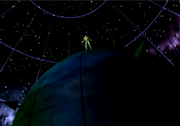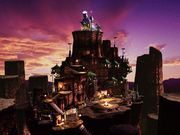
Bugenhagen explaining the lifestream in Final Fantasy VII.
Planetology (星命学, Seimeigaku?),[1][2][3] originally translated as Study of Planet Life,[4] is a philosophy in the Final Fantasy VII series. It is a set of beliefs pertaining to the relationship that life has with the planet, and the flow of the lifestream. The philosophy's followers include Avalanche and many others in Cosmo Canyon, and it is fiercely opposed by the Shinra Electric Power Company.
Planetology's core theme relates to spiritual energy in the circle of life. It proposes that after death, in addition to the body decomposing and returning to soil, their spiritual energy also returns to the planet in the form of the lifestream. Because the lifestream too is involved in the creation of new life forms, and is the blood of the planet itself, the philosophy proposes that draining mako—a liquefied form of lifestream—will accelerate the death of the planet. As such, followers staunchly oppose the use of mako reactors.
Planetology is one of the oldest belief systems, and predates religious beliefs in the Final Fantasy VII series. These likely stemmed from the ancient Cetra civilization, who were uniquely able to communicate with the planet. However, the philosophy, along with religion, were largely pushed back against by Shinra, claiming to have scientifically disproven it.
The teachings of planetology are found in various books and films in the Final Fantasy VII world.
History[]
Ancient history[]

A Cetra group accessing the lifestream.
The Cetra civilization, living around 2,000 years before 0007, communicated with the planet directly and were aware that the life force of all living things became spirit energy used in the lifestream. As such, when the calamity hit the planet, the Cetra tried to cultivate land around it in a way that would not diminish the needed energy.[5] Later, the Cetra would be talked about in planetology books as people who could commune with the planet.[1]
In the days of the Junon Republic, humans held religious beliefs about life and death. They believed in the afterlife, one would go to heaven or hell, which would be determined by gods (in a polytheistic religion) judging them by how they lived their life.[6] Similarly, a religion of which the Sector 5 slums church was part of was a monotheistic religion where worshippers prayed to God as a way to let the dead know they were thinking of them,[7] although the church became abandoned as people lost faith in God.[8] However, teachings of planetology had existed prior to this point.[6]
Modern era[]

Avalanche propaganda in the Sector 7 slums in Final Fantasy VII Remake.
Shinra largely extinguished belief in an afterlife, both in planetology and religion, by claiming to have scientifically proven nothing existed after death.[6] The belief was largely pushed to the underground, as screenings of planetology films in Midgar on planetology would have to be held in secrecy where people did not know where the next would take place until the morning of, as Shinra would crack down on them.[9] Nonetheless, the teachings were still passed on by many believers. Cosmo Canyon was home to many such believers, and people from around the world would come to visit Cosmo Canyon to learn more about it.[4]
Avalanche was founded by planetologists February 0001,[3] z in Cosmo Canyon.[4] The group would commit terrorist acts in the name of its beliefs, and because there were few protests in Midgar, action against Shinra was largely taken in the form of eco-terrorist acts by Avalanche and other such groups.[3] Barret Wallace, whose cell bombed Mako Reactor 1 in 0007, was a core believer in planetology, having read many books on its teachings[1] and attended screenings, through which he met Jessie Rasberry[10] with whom he formed his cell. Jessie also introduced Tifa to planetology through these screenings, as Tifa first learned about the philosophy in a screening led by a mentor of planetology named Yuri Romana.[6]
Beliefs[]

A planetology sequence in Bugenhagen's observatory in Final Fantasy VII.
Planetology teachings are passed on in the form of books[1][11] and screenings of films (although in Midgar, these were held in secrecy).[9]
The core dogma posits that the souls of all living things return to the planet as spirit energy, forming the lifestream, in much the same way their body decomposes after death. The lifestream, as such, is a path of energy of the souls roaming inside the planet, which is used to create new life, blessing newborns with their unique spirit energy. This is said to apply to every planet in the universe of Final Fantasy VII.[4]
The lifestream is said to be essential to every planet.[4] In its liquefied form of mako, it is described as the planet's lifeblood, and said that "the planet bleeds green like [humans] bleed red".[12] As such, planetologists staunchly oppose the use of mako energy, as this is comparable to bleeding the planet dry of its lifeblood. Planetology however states that the death of the planet is inevitable,[4] suggesting therefore that the use of mako energy would only expedite this process.
Planetology also discusses the Cetra civilization, describing them as original stewards of the planet who could commune with it.[1] The teachings include talk of the promised land, and contain accurate Cetra mantras.[13]
It is unknown how the philosophy relates to the religion that the Sector 5 slums church was part of, where believers worshipped God and prayed at the church[8] but followers similarly used prayer as a way to let the dead know they were thinking of them.[7]
Followers[]

Cosmo Canyon, a home of believers in planetology in Final Fantasy VII.
The most notable followers of planetology are in Cosmo Canyon, and in Avalanche. Planetology has believers all over the world, including Midgar, not all of who were Avalanche members.[9]
Planetology's reach is not universal, and the mainstream belief is that death is the end and oblivion. While Tifa Lockhart, who grew up in Nibelheim, was unaware of the philosophy (suggesting it did not reach the village),[6] Marle, of the Sector 7 slums, was aware of its beliefs and described them as "nonsense".[14] Despite lack of belief in the philosophy itself, President Shinra once claimed the public were aware of the "true nature of mako" and "willfully turn a blind eye to the cost";[15] however, he could have just as easily referred to the known environmental damage caused by mako reactors eroding life near Midgar.[3]
Planetology has a variety of interpretations, and impacts followers in different ways. While Avalanche commit eco-terrorism in its name, others, such as Bugenhagen, are more passive in believing the end of the world is inevitable.[4] Tifa, upon learning about planetology, found it appealing as she felt it lifted her of the burden of having to hang onto the memories of those she had lost in the Nibelheim Incident, as they were still with her in the lifestream; Red XIII largely disagreed with this view.[9]
Etymology[]
The real-world term planetology refers to the study of planets and other celestial bodies.
Citations[]
- ↑ 1.0 1.1 1.2 1.3 1.4 Final Fantasy VII Remake script § "Words of Hope"
- ↑ Final Fantasy VII Remake Trace of Two Pasts § "Traces of Tifa"
- ↑ 3.0 3.1 3.2 3.3 Final Fantasy VII Remake Material Ultimania, p. 258
- ↑ 4.0 4.1 4.2 4.3 4.4 4.5 4.6 Final Fantasy VII script § "In the Land of the Study of Planet Life"
- ↑ Final Fantasy VII script § "Icicle Inn optional dialogue"
- ↑ 6.0 6.1 6.2 6.3 6.4 Final Fantasy VII Remake Trace of Two Pasts, p. 131-132
- ↑ 7.0 7.1 Final Fantasy VII Remake Trace of Two Pasts, p. 266
- ↑ 8.0 8.1 Final Fantasy VII Remake Trace of Two Pasts, p. 220
- ↑ 9.0 9.1 9.2 9.3 Final Fantasy VII Remake Trace of Two Pasts, p. 133-134
- ↑ Final Fantasy VII Remake Trace of Two Pasts, p. 169-170
- ↑ Final Fantasy VII script § "Cosmo Canyon optional dialogue"
- ↑ Final Fantasy VII Remake script § "Breach Security"
- ↑ Final Fantasy VII Remake script § "A Way Out"
- ↑ Final Fantasy VII Remake Trace of Two Pasts, p. 172
- ↑ Final Fantasy VII Remake script § "Storming the Gates (continued)"
References[]
- Video games
- Square Co., Ltd. (1997). Final Fantasy VII [Game]. Square Co., Ltd.. PlayStation.
- Square Enix (2020). Final Fantasy VII Remake [Game]. Square Enix. PlayStation 4.
- Books
- Studio BentStuff (2020). Final Fantasy VII Remake Material Ultimania [Book]. Square Enix. ISBN 978-4-7575-6869-3.
- Kazushige Nojima (2023). Final Fantasy VII Remake Trace of Two Pasts [Book]. Square Enix. ISBN 978-4-7575-7348-2.
